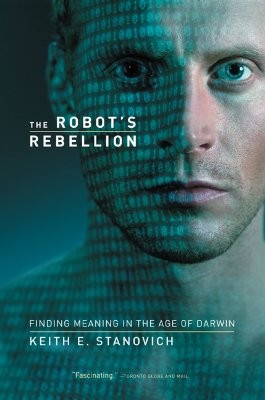| The Robot's Rebellion: Finding Meaning in the Age of Darwin Contributor(s): Stanovich, Keith E. (Author) |
|
 |
ISBN: 0226771253 ISBN-13: 9780226771250 Publisher: University of Chicago Press OUR PRICE: $17.82 Product Type: Paperback - Other Formats Published: October 2005 Annotation: The idea that we might be robots is no longer the stuff of science fiction; decades of research in evolutionary biology and cognitive science have led many esteemed scientists to the conclusion that, according to the precepts of universal Darwinism, humans are merely the hosts for two replicators (genes and memes) that have no interest in us except as conduits for replication. Richard Dawkins, for example, jolted us into realizing that we are just survival mechanisms for our own genes, sophisticated robots in service of huge colonies of replicators to whom concepts of rationality, intelligence, agency, and even the human soul are irrelevant. Accepting and now forcefully responding to this decentering and disturbing idea, Keith Stanovich here provides the tools for the "robot's rebellion," a program of cognitive reform necessary to advance human interests over the limited interest of the replicators and define our own autonomous goals as individual human beings. He shows how concepts of rational thinking from cognitive science interact with the logic of evolution to create opportunities for humans to structure their behavior to serve their own ends. These evaluative activities of the brain, he argues, fulfill the need that we have to ascribe significance to human life. We may well be robots, but we are the only robots who have discovered that fact. Only by recognizing ourselves as such, argues Stanovich, can we begin to construct a concept of self based on what is truly singular about humans: that they gain control of their lives in a way unique among life forms on Earth--through rational self-determination. |
| Additional Information |
| BISAC Categories: - Science | Philosophy & Social Aspects - Science | Life Sciences - Evolution - Psychology | Cognitive Psychology & Cognition |
| Dewey: 128 |
| Physical Information: 1" H x 6.06" W x 9" (1.10 lbs) 374 pages |
| Descriptions, Reviews, Etc. |
| Publisher Description: The idea that we might be robots is no longer the stuff of science fiction; decades of research in evolutionary biology and cognitive science have led many esteemed thinkers and scientists to the conclusion that, following the precepts of universal Darwinism, humans are merely the hosts for two replicators (genes and memes) that have no interest in us except as conduits for replication. Accepting and now forcefully responding to this disturbing idea that precludes the possibilities of morality or free will, among other things, Keith Stanovich here provides the tools for the "robot's rebellion," a program of cognitive reform necessary to advance human interests over the limited interest of the replicators. He shows how concepts of rational thinking from cognitive science interact with the logic of evolution to create opportunities for humans to structure their behavior to serve their own ends. These evaluative activities of the brain, he argues, fulfill the need that we have to ascribe significance to human life. Only by recognizing ourselves as robots, argues Stanovich, can we begin to construct a concept of self based on what is truly singular about humans: that they gain control of their lives in a way unique among life forms on Earth--through rational self-determination. "Stanovich offers readers a sweeping tour of theory and research, advancing a programme of 'cognitive reform' that puts human interests first. . . . By making the point that cognition is optimized at the level of genes, not of individuals, Stanovich puts a fresh spin on the familiar claim that people are sometimes woefully irrational. . . . With "The Robot's Rebellion," he sets himself apart from unreflectivethinkers on both sides of the divide by taking evolutionary accounts of cognition seriously, even as he urges us to improve on what evolution has wrought."--Valerie M. Chase, "Nature " |